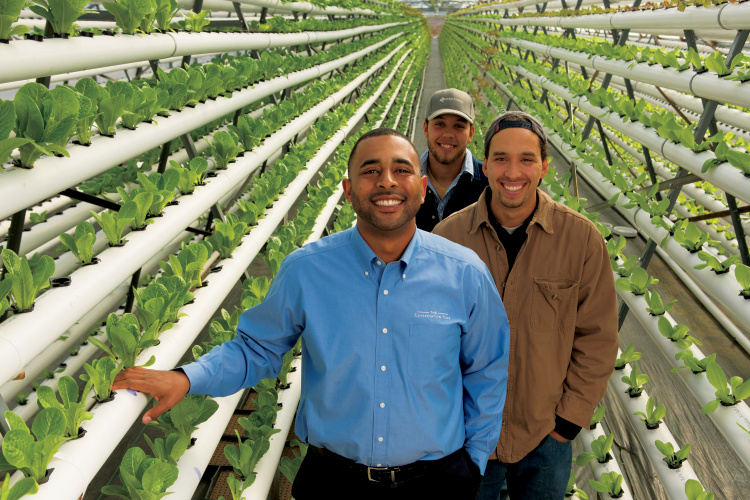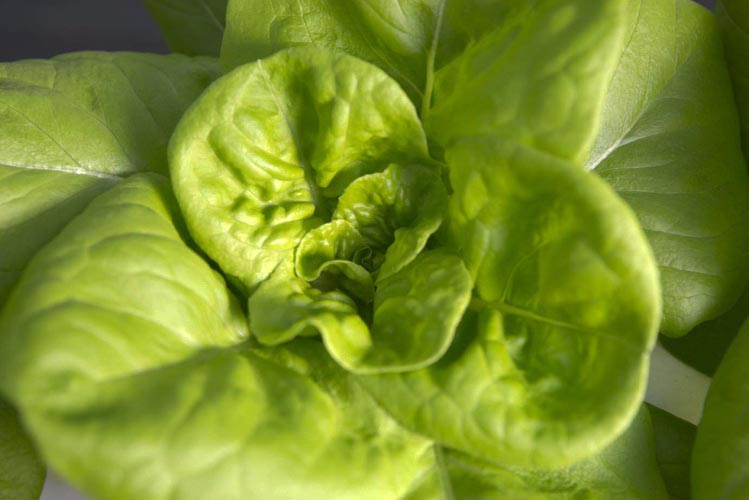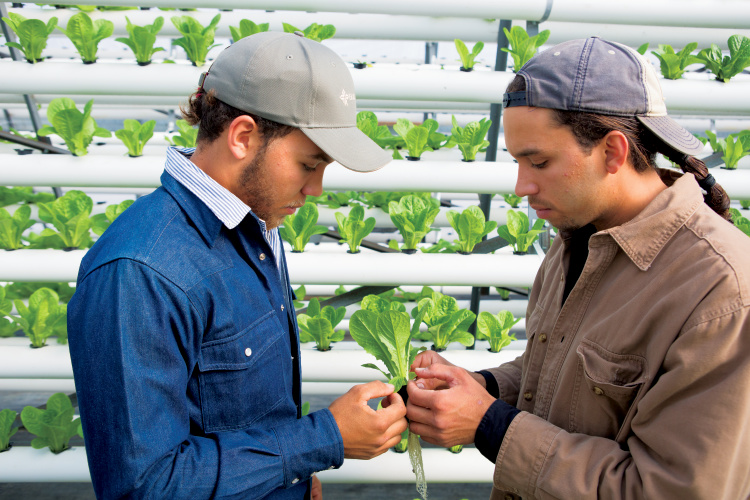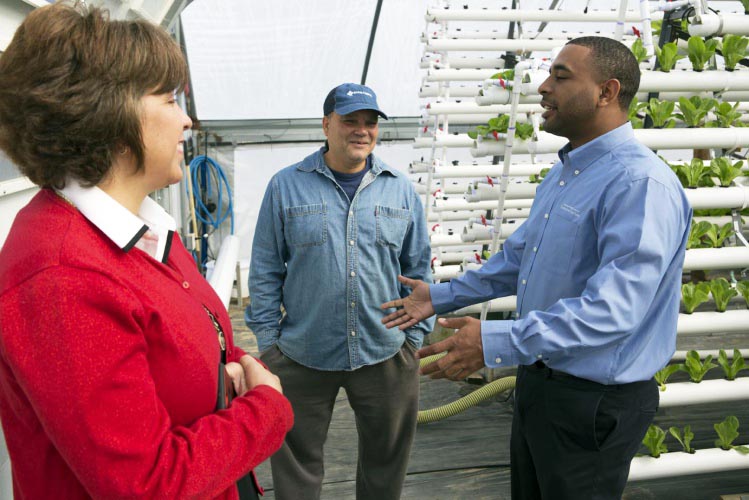Julius Tillery of The Conservation Fund Plants Crops and Ideas
Julius Tillery and The Conservation Fund work to change the economic and environmental outcomes of rural communities.
Teree Caruthers |
Start a conversation with Julius Tillery about the future of agriculture, and you’d best settle in. The 31-year-old, fifth-generation farmer could talk for hours about his favorite subject, and you could listen for hours, too. His knowledge of topics such as resource management, diversification and rural development is vast, and his enthusiasm is contagious. His talent for capturing audiences’ attention has helped with his work traveling across the state as a farm resources coordinator for The Conservation Fund, a nonprofit organization dedicated to supporting economic and environmental vitality through conservation practices.
“The fund focuses on conservation that generates environmental, economic and social benefits,” says Monica McCann, associate director of resourceful communities for the organization. “We believe that smart, collaborative conservation can create lasting economic progress and make communities more vibrant.”
A Family Affair
“Conservation is important to me and my family, in general, because we know if we don’t take care of our land, our land will not be able to take care of us,” Tillery says of the motivation behind his work. “My father taught the first water conservation high school class in the state. I’ve always followed his lead in just understanding conservation principles in general.”
Tillery still works alongside his father. The family farms 125 acres of cotton, soybeans, collards, broccoli, salad greens and mushrooms. The farm’s diversity is another example of the family’s conservation efforts.
“With commodity prices being in flux, we have to make sure that we have different crops to help us revenue-wise, but not only for revenue purposes,” Tillery says. “If you raise the same crops on the same land every year, it takes away from the soil health, so we try to diversify which fields we raise cotton on and then change over to soybeans each year so we can keep the soil healthy.”

Spreading the Message
He spreads this message to other farmers as a member of The Conservation Fund’s Resourceful Communities program, which works to preserve the state’s rural landscape in ways that benefit communities, which are often some of the most economically and socially distressed. Through his job, Tillery helps minority farmers, in particular, increase their revenue potential by connecting them with new markets all along the food chain.
“A lot of minority farmers face challenges in connecting with people they don’t know. I have a lot of partners through The Conservation Fund, so I try to connect them to each other,” he says. “Typically, our older farmers don’t use the internet.”
Because of that fact, Tillery facilitates networking for people whose skills and businesses complement each other. He connects farmers markets to vegetable farmers, and farmers to resource providers, which can be another challenge. Often, the farmers don’t have enough capital, resources, or technical assistance to make their operations more efficient and pro table. Through Tillery, they can learn about potential resources, such as the Farm Bureau, the N.C. and U.S. departments of agriculture, and various nonprofit organizations.
“We also have programs that focus on distribution,” says McCann. “We’re helping farmers broaden their customer base while making sure healthy food gets to communities that need it.”

Coming Up Green
Tillery points to fellow farmer Roderick McMillan as a successful example. McMillan owns MG3 in Maxton with his family. A little over a year ago, he decided to convert an old tobacco barn on the family’s property into a 10,000-square-foot, vertical, hydroponic greenhouse capable of growing some 50,000 plants at a time.
“Roderick McMillan, he’s an absolute success story,” Tillery says. “He started [hydroponic farming] at age 24 just by looking at YouTube videos.”
McMillan comes from a traditional row-cropping farm, which refers to crops grown in rows, such as corn, soybeans, peanuts and cotton. However, he wanted to bring a new opportunity to his family farm business.
“I helped connect him with some of these institutional buyers,” Tillery says. “He’s learning about how people purchase certain crops. He’s diversified his business to match the buying habits of the institutional buyers. If he knows there’s a lot of lettuce at certain times of the year, he wouldn’t want to raise lettuce then. He would try to raise kale or spinach. Now, he’s getting into tomatoes.”
The advice has paid off. The McMillans produce between 7,000 and 10,000 heads of lettuce a week for half a dozen CSAs and local restaurants. McMillan says Tillery also helped him leverage social media to connect with more customers.
“I first learned about Julius by following him on Facebook, and I saw how he was getting exposure for his cotton business. So I followed his lead and started posting more pictures of my produce and our operation,” McMillan says. “I found it is way more efficient advertising on Facebook because I can reach so many more people than if I just [advertised] locally.”

Watering the Food Desert
Tillery says he hopes by connecting producers like McMillan to local customers, he can also help improve the physical and economic health of those communities.
“Where I’m from, we don’t have a lot of grocery stores. People are eating a lot of processed foods. With the increase in farmers markets popping up and the promotion of fresh, healthy food, I think we’re helping get more vegetables into the diets of these communities and improving their health,” Tillery says. McCann agrees. “We believe it’s important for consumers to be aware and educated about their food and where it comes from, as well as understand the value that sustainable agriculture adds to rural communities – not only providing fresh, healthy food, but also making local economies stronger.
– Teree Caruthers



This was an awesome read for me and gives me so much hope! My son is retiring from the military in a few months and has always dreamed of starting a hydroponics farm business. He and I were actually just discussing it less than a week ago and his enthusiasm for this business is still growing. I will be sharing this with him shortly. Hopefully when he is ready to start, he will maybe run into Julius Tillery and get some educated advice. Thank you for sharing this.
Great read. Keep up the good work. Very good advice. My dad Wilson Hardy used to rotate his crops to.
The initiative and efforts of this young man is boundless. He has shown that dedication, fortitude and support work toghther to make dreams come true. He is doing what he loves and makes his family and community proud. Thanks Mr. Julius for the help and support.